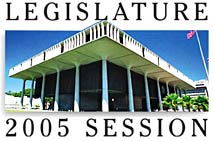Watchdog’s
wishes await fate
Campaign spending reform
proposals are contained in a
Senate bill that is progressing
With the pending retirement of Robert Watada, the state's campaign spending watchdog, one key lawmaker says she is hopeful the Legislature will be able to pass at least some of his reform proposals this year.
|
|
Watada, who has served as executive director of the commission for about a decade, announced plans last year to retire at the end of the 2005 session. Investigations conducted under his watch have helped thwart former Honolulu Mayor Jeremy Harris' 2002 gubernatorial bid and led to criminal convictions of three isle lawmakers.
Many of Watada's reform proposals are contained in a wide-ranging bill passed last week by Hanabusa's Judiciary Committee.
Among other changes, Senate Bill 440, Senate Draft 1, would:
» Ban contributions from state and county contractors from the time a contract is signed until the contract is completed.
» Prohibit fund raising on state or county property.
» Restrict certain contributions from banks and corporations.
» Bar candidates from contributing campaign funds to charities.
"I believe that you will see -- probably as this bill progresses -- more and more opposition from the corporations and banks and also labor unions as to their ability to contribute and their First Amendment rights," said Hanabusa (D, Nanakuli-Makua).
She also noted that a similar proposal in the House has not had a hearing, meaning the issue is likely to wind up in conference committee where both sides would have to agree on any changes to existing campaign spending laws.
Meanwhile, lawmakers in the each chamber have advanced bills to establish a system of public financing for political campaigns.
The proposals (HB 1713, HD 1, and SB 1689, SD 1) would establish a bank of funds that could be tapped by state legislative candidates and candidates for governor and lieutenant governor who agree to abide by campaign contribution and expenditure limits and meet other criteria.
Laure Dillon, executive director of Hawaii Clean Elections, said similar laws have been successful in other states including Arizona, where Gov. Janet Napolitano became the first U.S. governor elected with public funds in 2002.
"A great many of the problems of the private system go away with the public system," Dillon said. "When you cut the ties to campaign contributions from private people and the contributions come from a public source, then the move is to a public agenda, as opposed to the agenda of the donors."
The public-funding bills now face hearings before the money committees in each chamber.
[News] [Business] [Features] [Sports] [Editorial] [Do It Electric!]
[Classified Ads] [Search] [Subscribe] [Info] [Letter to Editor]
[Feedback]

